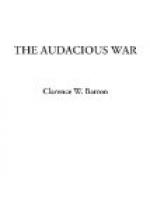I believe that Lord Cowdray is to-day the foremost business man in England. He represents oil lands in Mexico worth intrinsically more than $100,000,000. Is it the policy of the British government to say, “Cowdray, forget it, and come over and develop Mesopotamia; living is unsettled in Mexico, and Uncle Sam has told ’em to fight it out”?
A third lesson the United States will receive from this war is the value of large units in business and the value of national wealth as national defense.
Instead of trying to pull down wealth and individual accretions of wealth, the country will recognize that all savings and every increment of fortune, small or large, are for the ultimate benefit and for the prosperity and defense of the whole country.
In this war Russia is poor in railroads, and the advantage that Germany has held over her in Poland is more by reason of the German railways than the German armies. Railways are products of wealth and individual capital, and the sooner the United States learns this lesson, the better.
A fourth lesson for the United States from this war is the value of gold in bank reserves, and the value of ability to mobilize quickly such reserves. No nation in the world to-day is more closely tied to every other nation than by the invisible strings of gold. Every nation in the world has an interest in the gold supply and the gold reserve in bank throughout the world.
There are those in England who still believe that this war will be the supreme test of the gold monometallic base for money and banking. There is no thought as yet that Germany, if driven off the gold base, will seek a silver base. It has always been declared by the bimetallists that the successor of gold monometallism will be paper, and Germany is expected to go upon a paper rather than a silver basis.
In exchange operations German paper is about 8 per cent discount, but exporting gold or buying or selling gold at a premium is by law forbidden. All are penal offenses.
England can stand upon a gold basis because she commands the gold promises to pay, but in war time she can threaten the stability of the monetary systems of many countries. The United States saved its gold base by closing the Stock Exchange, but the South American countries were quickly in distress for gold.
To put India on a gold basis a few years ago, a tax was levied on Indian silver imports with the result that India has absorbed $400,000,000 in gold from England in the last five or six years, and where payments to India were formerly one-quarter gold and three-quarters silver, they are now one-quarter silver and three-quarters gold.
All these matters are being sharply watched by the English economists.
A fifth lesson we may draw from the war is the necessity for a larger official representation abroad. It was fortunate that before the outbreak of the war the American embassy in London had been moved to larger quarters by the gardens west of Buckingham Palace.




